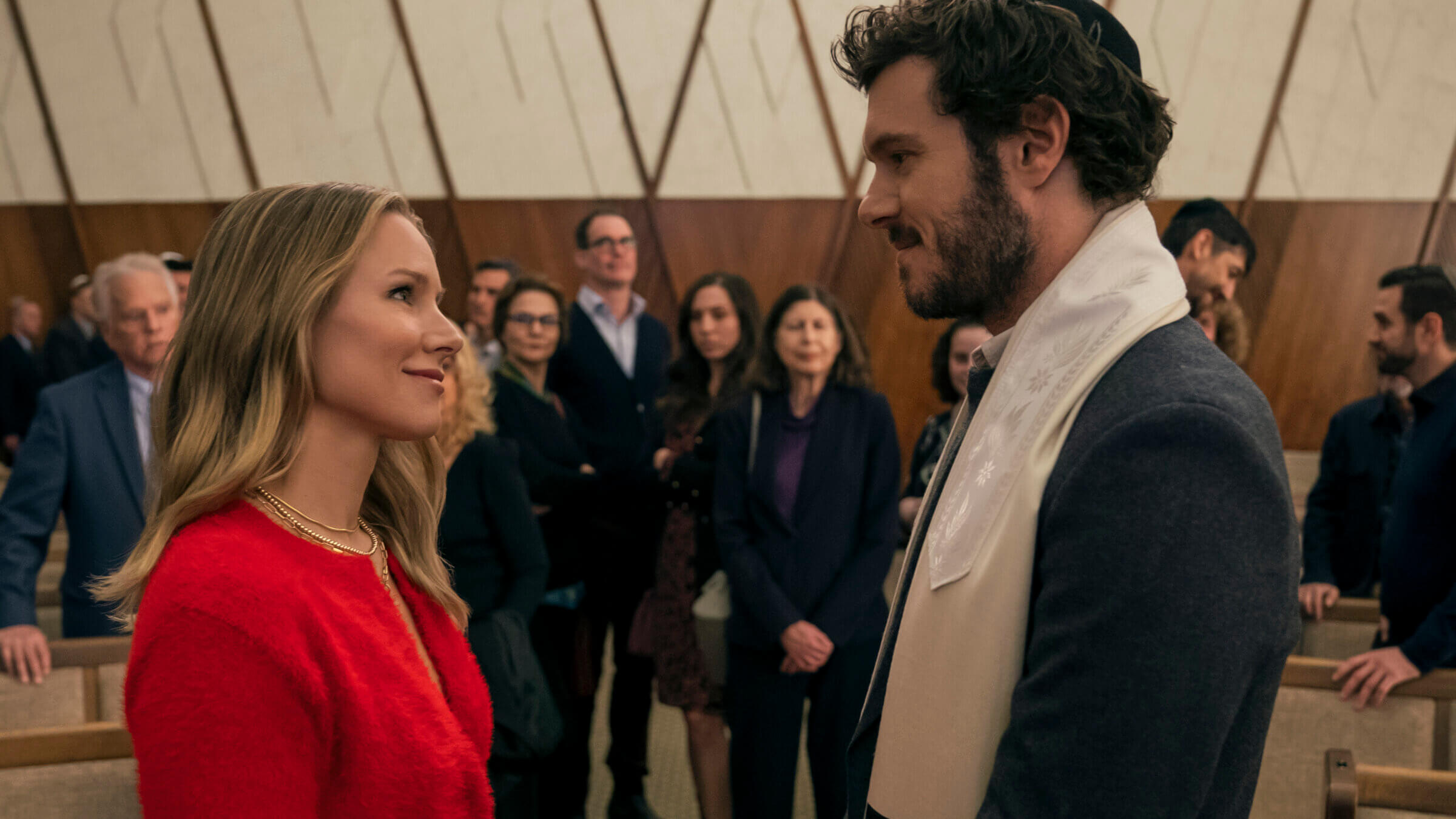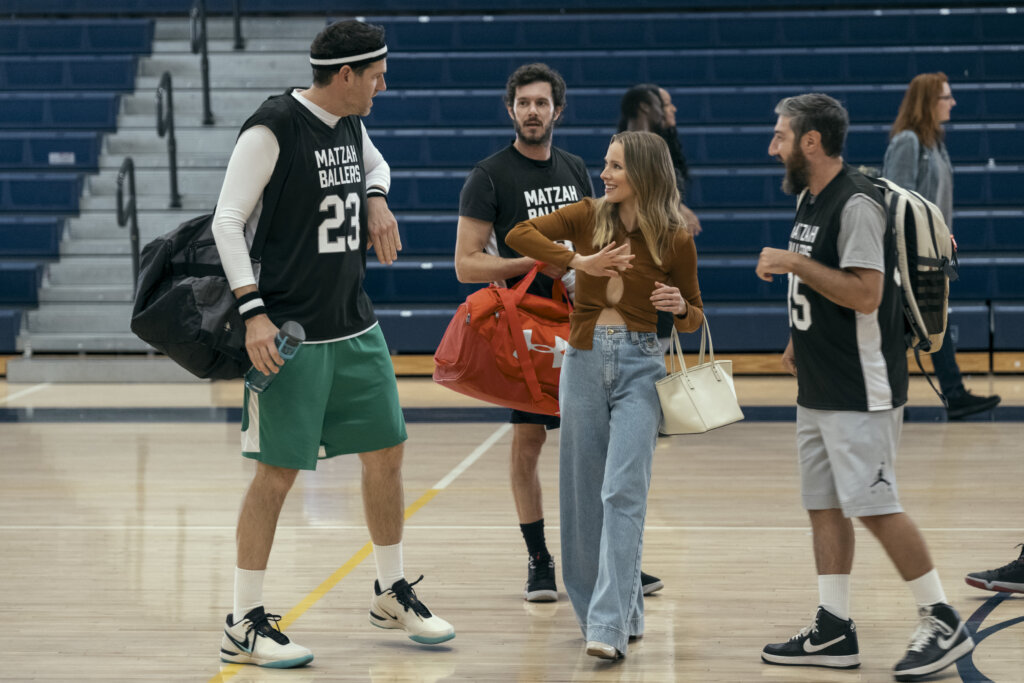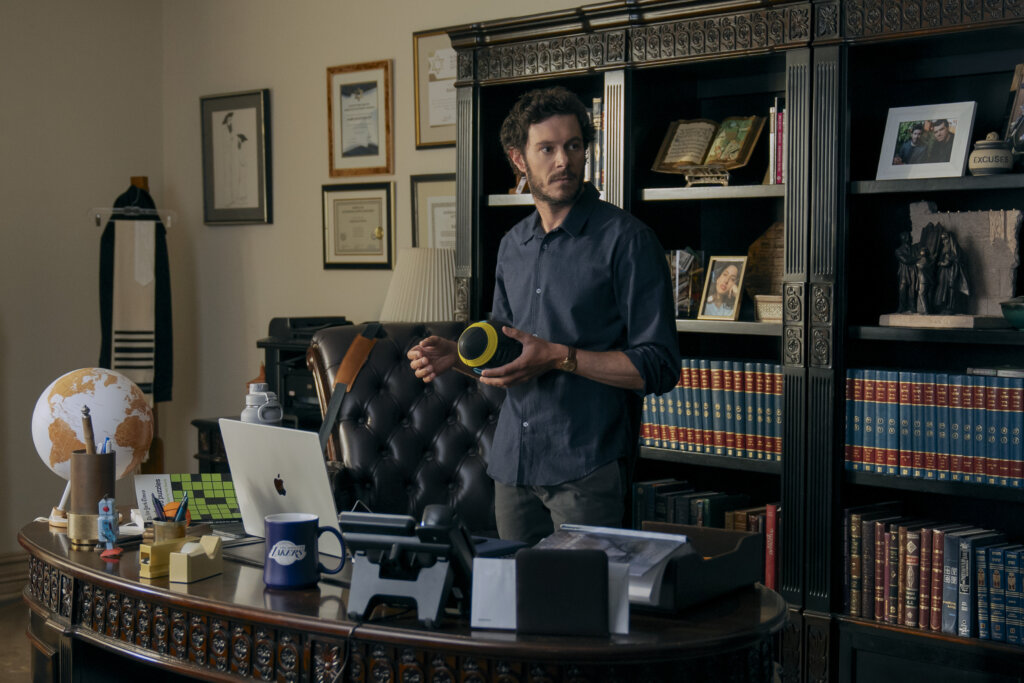Netflix finally gave Jews our Hot Rabbi. Too bad every other Jew in the show sucks
Adam Brody and Kristen Bell star in ‘Nobody Wants This,’ a romcom about a rabbi falling for a non-Jew

A rabbi and a blonde woman: an unheard of pairing, at least according to the show. Courtesy of Netflix
Jews are finally getting their Hot Rabbi. After Hot Priest became a sensation thanks to Fleabag, it’s our turn with Nobody Wants This, Netflix’s new romcom series starring Adam Brody as a hot rabbi named Noah and a blonde named Joanne (Kristen Bell) as his non-Jewish love interest.
Noah is, indeed, a hot rabbi. (The tweens at his Jewish summer camp literally call him “hot rabbi.”) And not only is he hot, he’s romantic and funny and thoughtful. He is the perfect guy, a true heartthrob. The epitome of the Nice Jewish Boy. A great advertisement for the Jewish people! Alas, the rest of Nobody Wants This is not.
Just the show’s trailer contained a solid hodgepodge of negative Jewish stereotypes, as many Jews online noticed. Don’t worry — they continue through the entire show. (Explaining how will involve spoilers; consider this your warning!)
To be fair, some of the more obvious problematic moments are actually used as opportunities to undermine negative tropes. When Joanne’s sister Morgan tries to subtly text her that Noah is “cuter than I expected” and “doesn’t look that Jewish,” the texts get automatically read aloud by Siri, leading Noah and his brother to both jump to ask what, exactly, Jews look like. Should he have a bigger nose? Curlier hair? “Does my brother not look like he could control the media?” his brother, Sascha, asks indignantly.
Is it a little on the nose? Extremely. But at least the show is trying.
The same goes for the time Joanne asks Noah if he’s allowed to have sex — yes — and if it’s offensive to say she doesn’t believe in God. “Baked into the Jewish experience is wrestling with what God is or isn’t, and not knowing,” says Noah. Judaism! It’s not as extremist and weird as people — or at least Joanne — think.

Unfortunately, Nobody Wants This leaves a lot of other stereotypes standing.
There’s Noah’s shrewish Jewish mother (Tovah Feldshuh) who spits “shiksa” when she sees Joanne but sneaks off to eat prosciutto. There’s the basketball team, the Matzah Ballers, who obviously are terrible because Jews are bad at sports, if you hadn’t heard. And don’t forget the cadre of women at Noah’s temple trying to marry off their undesirable daughters; one is advertised as having just recovered from shingles.
Of course, broad comedy is a foundation of the romcom genre. But it’s notable that the non-Jewish characters, though also kind of screwy, are warm and loving, while the Jews — really only the Jewish women — are actually just mean or vapid. (It’s not just Noah who is drawn to a non-Jewish woman; all the Jewish men on the show seem pulled to the openness and fun that can only, apparently, come from a non-Jewish woman.)
But it’s not just the cheap laughs at overdone tropes about Jewish mothers that make Jews look bad. Nobody Wants This frames Judaism as the main threat to the driving force of every romcom: love. After all, a Jew and a shiksa can never be together.
In the end — again, spoiler alert — love wins. In the final episode, Joanne realizes she doesn’t want to be Jewish and walks away from Noah, leaving him free to be the head rabbi at his synagogue and live his best Jewish life. But he runs after her: “You’re right. I can’t have both,” he tells her, and then kisses her.

This is the obvious choice, since Judaism, at least as presented in the show, is little more than a strange set of family customs that get in Noah’s way; we don’t see it providing anything positive to Noah’s life, so the stakes are low. Sure, Noah’s dream is to be head rabbi, but people give up opportunities in movies all the time for the sake of true love. (I mean Jack gave up his spot on the lifeboat in Titanic!)
I’ll leave aside the fact that rabbis actually can, in some movements, marry non-Jews, and there’s no reason that Judaism should be a major impediment to love; that’s a relatively new innovation. But the reason Noah’s choice feels so offensive is that it’s not really clear why Noah would give up something so large for Joanne.
Romcoms aren’t known for their character development, but while Noah is supportive and kind to Joanne, we don’t see her offering him anything worth giving up his entire culture, religion and identity. In fact, she’s often sort of mean to him. And doesn’t it seem like the bare minimum for a good partner to Google basics like, say, “What is Shabbat?” before showing up for a weekend at a Jewish summer camp where your boyfriend is leading services? As far as I can tell, Joanne’s main draw is that she isn’t Jewish.
Nobody Wants This is clearly a show made for non-Jews, as is obvious from the awkward explanations of when exactly Shabbat begins and definitions of basic terms like “mitzvah.” It feels closer to one of Hallmark’s attempts to slot one Hanukkah movie into their Christmas lineup than it does to some of the incisive, nuanced Jewish shows we’ve gotten in the past few years. Unorthodox, Shtisel and The Patient did not trip over themselves explaining the basics of every Jewish reference; they trusted their audience to figure it out.
Perhaps the show’s, uh, hamfisted attempts to explain Jewish basics is a result of the show getting a big launch. Netflix is pouring publicity money into it: The New York Times did a big profile on Brody’s return as a grown-up version of his breakout character, nerdy Jewish teen heartthrob Seth Cohen from The O.C. New York Magazine published another big profile, this one on Erin Foster, the show’s creator and a blonde non-Jew who married a nice Jewish boy herself. It stars big names, like Bell and Brody, and it is, admittedly, a binge-watch that goes down easy; a lot of people will probably see it.
But if Nobody Wants This was intended for an audience that has never met a Jew in their life, then it should have been more careful about the way it showcased Judaism. Foster said that she wanted the show to reflect her experience as someone who chose Judaism, as she did. Yet there’s no reason to imagine why anyone would follow in her shoes when the only positive portrayal of Jewishness in the show is Noah, who is presented as an anomaly. (Foster also said that, if the series is renewed, she’d like the next season to focus on conversion, even though Joanne has already said she wouldn’t do it.)
As I watched the final episode, I found myself rooting against love. I hoped that, like Fleabag’s Hot Priest, Brody’s Hot Rabbi would realize that love shouldn’t require giving up your entire identity and value system. That he’d walk away. That the show would tell its audience that Judaism is more than just a curiosity or quirky family custom. But this is, after all, a romcom. So he didn’t walk away — he ran after her.

















